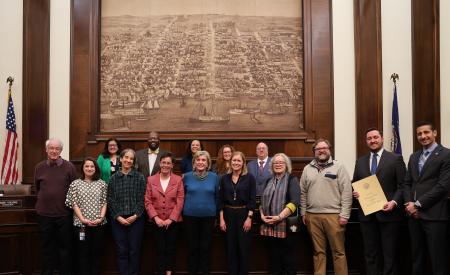Nation's First City Archaeological Commission Celebrates 50 Years This Month

The Alexandria Archaeological Commission (AAC) proudly received a proclamation from City of Alexandria Mayor Alyia Gaskins and City Council recognizing their 50th anniversary. Since February 25, 1975, the AAC has been at the forefront of advocating for, preserving, and interpreting the 13,000-year-old archaeological heritage of Alexandria, Virginia. The 15-member Commission, appointed by City Council, is a national model for community archaeology. Working closely with the City's archaeology staff and other departments, the AAC establishes goals and priorities that advance awareness of Alexandria's rich past and how it informs the present. The City of Alexandria was a pioneer in community-based archaeology, and through the AAC, continues to lead the nation in this field.
“For the past 50 years, the AAC has played a pivotal role in shaping Alexandria’s archaeological legacy, creating a city where history is not only preserved but made visible for all to experience,” said Alexandria’s City Archaeologist, Dr. Eleanor Breen. “This anniversary is an opportunity to celebrate the dedication and hard work of the AAC in making Alexandria a leader in archaeological research and interpretation. Their advocacy over the past half-century is reflected in sites such as the Contrabands and Freedmen Cemetery Memorial, Tide Lock Park, and African American Heritage Park, as well as along the waterfront and in the Alexandria Archaeology Museum. Their contributions to the City are profound and enduring.”
The AAC also received statewide commendation for their 50 years of service. On Friday, January 31, Virginia State Delegate Elizabeth Bennett-Parker presented AAC Chair, Ivy Whitlatch, with House Joint Resolution no. 433 in honor of the anniversary. Patrons of the resolution also included Delegate Charniele Herring, Delegate Alfonso Lopez, and Senator Adam Ebbin.
“The true celebration is for the dedicated women and men who have served on the AAC over the past 50 years,” said AAC Chair Ivy Whitlatch. “From working to enact the Alexandria Archaeological Protection Code to hiring the City’s first City Archaeologist, Dr. Pam Cressey, who established the division, their tireless advocacy shaped the interpretation of Alexandria’s history. We invite the community to join the AAC and the dedicated, expert staff who are devoted to preserving Alexandria’s past in recognition of this vision as we prepare for tomorrow’s discoveries.”
The Alexandria Archaeology Commission has fostered a deeper appreciation for Alexandria’s diverse history, while also supporting the city’s cultural tourism sector. As the AAC looks toward the next 50 years, they remain committed to advancing archaeological research and ensuring that Alexandria’s archaeological past is shared with future generations.
###
About the Alexandria Archaeology Commission:
The Alexandria Archaeology Commission is a City Council appointed body with a mission to advocate for archaeology across multiple platforms and audiences, support Alexandria Archaeology and the Archaeology Museum, and recognize the community for contributions to archaeology within the City of Alexandria.
About the Alexandria Archaeology Museum
The Alexandria Archaeology Museum is dedicated to preserving and studying Alexandria’s rich archaeological heritage and fostering within residents and visitors a connection between the past and present while inspiring a sense of stewardship and adventure. Visit the museum and lab on the third floor of the Torpedo Factory Art Center, at 105 N. Union Street in historic Old Town Alexandria.
About the Office of Historic Alexandria
The Office of Historic Alexandria preserves and shares the history of the City of Alexandria with eight museums, historic sites, archives, archaeology, tours, exhibits and public programs. Through powerful storytelling and confronting the City’s past, Historic Alexandria enriches the present and inspires the future. We enhance the quality of life for residents and visitors and serve as a partner in the City’s equity and inclusion initiatives. For more information, visit alexandriava.gov/Historic.